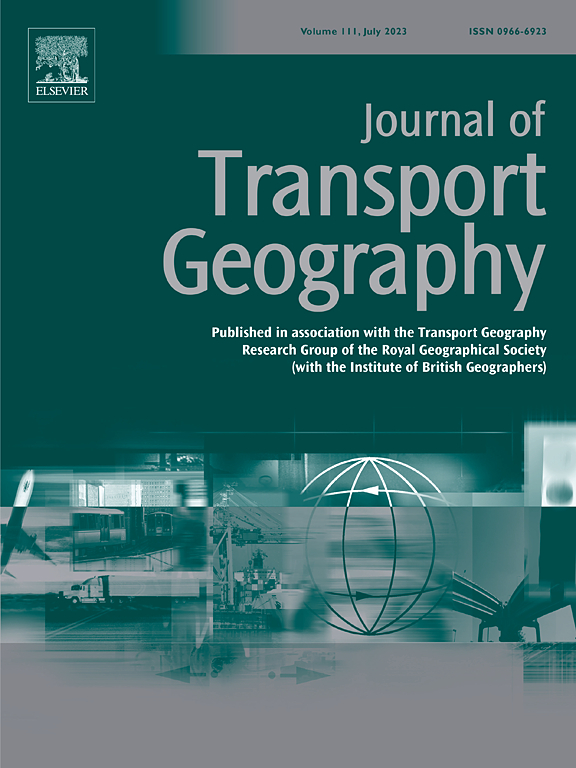Assessing the impacts of free-floating shared micromobility services on docked bike-sharing: Insights from the case studies of Poznań and Brussels
IF 6.3
2区 工程技术
Q1 ECONOMICS
引用次数: 0
Abstract
For many years docked bike-sharing systems in hundreds of cities were developed under the auspices of local public authorities, and thus within a regulated perspective. Then, within a short time window, new operators appeared on the streets with an offer of free-floating e-scooters, e-bikes and e-mopeds. These free-floating micromobility services were often introduced hastily, sometimes without prior consultation with local authorities. The main motive for their introduction was financial profit, rather than integration into the local transport eco-system and mobility policy framework. The aim of this study is to explore the impact of the introduction of free-floating shared micromobility services (and especially e-scooters) on docked bike-sharing systems and to address whether these could have been the main reason for the closure or decline of some of them. We aimed to examine this in two different cities (i.e., Poznań, Poland and Brussels, Belgium), where different models of docked bike-sharing were used. We used different sources of data: aggregated rentals of shared bikes for a time span of over 10 years, disaggregated data (bike station level) and interviews with stakeholders. Our analysis suggests that the introduction of e-scooters to both cities contributed to a decline in shared bike rentals, which amounted to around 40 % in Brussels and 80 % in Poznań before the scheme's eventual closure in 2022. However, the usage decline in Brussels was much smaller than the actual usage of free-floating e-scooters and e-bikes. It should be noted that other factors have likely contributed to the decline in Poznań being much greater than in Brussels, such as restrictions on bike-sharing use during the Covid-19 pandemic and insufficient maintenance of the bicycles. In addition, differentiated spatial patterns were also observed. For instance, in Poznań the highest decrease in rentals was observed in the city centre, whereas the lowest decrease was seen in the case of a bike station close to a transport hub with train, tram and bus stations. This research can be useful, in deciding how to develop resilient shared micromobility systems in a complex and constantly changing urban transport eco-system.
评估自由浮动共享微交通服务对停靠式共享单车的影响:来自波兹纳斯和布鲁塞尔案例研究的见解
多年来,在当地公共部门的支持下,数百个城市的共享单车系统得到了发展,因此在监管范围内。然后,在很短的时间内,新的运营商出现在街道上,提供自由浮动的电动滑板车、电动自行车和电动助推车。这些自由流动的微型移动服务往往是仓促推出的,有时没有事先与地方当局协商。引入它们的主要动机是经济利益,而不是融入当地的交通生态系统和交通政策框架。本研究的目的是探讨引入自由浮动的共享微型交通服务(尤其是电动滑板车)对停靠式共享单车系统的影响,并探讨这些服务是否可能是其中一些系统关闭或衰落的主要原因。我们的目的是在两个不同的城市(即波兰的波兹纳斯和比利时的布鲁塞尔)进行研究,这两个城市使用了不同的共享单车模式。我们使用了不同的数据来源:超过10年的共享单车租赁汇总数据、分类数据(自行车站级别)和对利益相关者的访谈。我们的分析表明,电动滑板车在这两个城市的引入导致了共享自行车租赁的下降,在布鲁塞尔和波兹纳齐,在该计划最终于2022年关闭之前,这两个城市的共享自行车租赁下降了约40%和80%。然而,布鲁塞尔的使用量下降幅度远小于自由浮动电动滑板车和电动自行车的实际使用量。值得注意的是,波兹纳斯的下降幅度可能比布鲁塞尔大得多,比如新冠肺炎疫情期间对共享单车的限制,以及对自行车的维护不足。此外,还观察到不同的空间格局。例如,在波兹纳斯,市中心的租金下降幅度最大,而靠近有火车、电车和公共汽车站的交通枢纽的自行车站的租金下降幅度最小。这项研究对于决定如何在复杂和不断变化的城市交通生态系统中开发有弹性的共享微交通系统是有用的。
本文章由计算机程序翻译,如有差异,请以英文原文为准。
求助全文
约1分钟内获得全文
求助全文
来源期刊

Journal of Transport Geography
Multiple-
CiteScore
11.50
自引率
11.50%
发文量
197
期刊介绍:
A major resurgence has occurred in transport geography in the wake of political and policy changes, huge transport infrastructure projects and responses to urban traffic congestion. The Journal of Transport Geography provides a central focus for developments in this rapidly expanding sub-discipline.
 求助内容:
求助内容: 应助结果提醒方式:
应助结果提醒方式:


